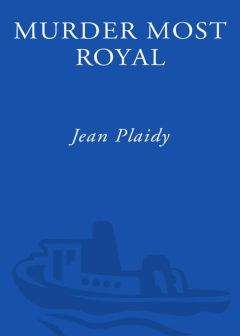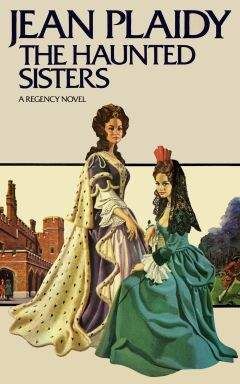Let its sound my death tell;
For I must die,
There is no remedy,
For now I die . . .”
She dressed herself with such care that it might have been a state banquet to which she was going instead of to the scaffold. Her robe of gray damask was trimmed with fur and low cut; beneath this showed a kirtle of crimson. Her headdress was trimmed with pearls. She had never looked more beautiful; her cheeks were flushed, her eyes brilliant, and all the misery and fear of the last weeks seemed to have been lifted from her face.
Attended by four ladies, among them her beloved Mary Wyatt, with much dignity and grace she walked to the green before the church of St. Peter ad Vincula. Slowly and calmly she ascended the steps to that platform which was strewn with straw; and she could smile because there were so few people to witness her last moments, smile because the hour and place of her execution had had to be kept secret from the people.
Among those who had gathered about the scaffold she saw the Dukes of Suffolk and Richmond, but she could feel no enmity towards these two now. She saw Thomas Cromwell, whose eldest son was now married to Jane Seymour’s sister. Ah, thought Anne, when my head has rolled into the sawdust, he will feel an impediment lifted and his relationship to the King almost an accomplished fact.
She called to her one whom she knew to be of the King’s privy chamber, and said she would send a message by him to the King.
“Commend me to His Majesty,” she said, “and tell him that he hath ever been constant in his career of advancing me; from a private gentlewoman, he made me a marchioness, from a marchioness a queen, and now he hath left no higher degree of honor, he gives my innocency the crown of martyrdom.”
The messenger trembled for she was a woman about to die, and how could he dare carry such a message to the King!
Then she would, after the etiquette of the scaffold, make her dying speech.
“Good Christian people,” she said, “I am come hither to die, according to law, for by the law I am judged to die, and therefore I will speak nothing against it . . .”
Her ladies were so overcome with weeping that she, hearing their sobs, was deeply moved.
“I come hither to accuse no man,” she continued, “nor to speak anything of that whereof I am accused, as I know full well that aught that I say in my defense doth not appertain to you . . .”
When she spoke of the King, her words were choked. Cromwell moved nearer to the scaffold. This was the moment he and the King had most feared. But with death so near she cared nothing for revenge. All the bitterness had gone out of her. Cromwell would arrange the words she spoke, not only as they should best please the King, but also that they should mislead the public into thinking she had died justly. The people must be told that at the end she had only praise for the King, that she spoke of him as a merciful prince and a gentle sovereign lord.
Her voice cleared and she went on: “If any person will meddle with my cause I require them to judge the best. Thus I take my leave of the world and of you, and I heartily desire you all to pray for me.”
It was time for her now to lay her head upon the block and there was not one of her attendants whose hands were steady enough to remove her headdress; they could only turn from her in blind misery. She smiled and did this herself; then she spoke to each of them gently, bidding them not to grieve and thanking them for their services to her. Mary she took aside and to her gave a little book of devotions as a parting gift and whispered into her ear a message of good cheer that she might give it to her brother in the Tower.
Then she was ready. She laid her head upon the block. Her lips were murmuring her own verses.
“Farewell my pleasures past,
Welcome my present pain,
I feel my torments so increase
That life cannot remain.
Sound now the passing bell,
Rung is my doleful knell,
For its sound my death doth tell.
Death doth draw nigh,
Sound the knell dolefully,
For now I die.”
She was waiting now, waiting for that swift stroke, that quick and subtle pain.
“Oh, Lord God have pity on my soul. Oh, Lord God . . .”
Her lips were still moving as her head lay on the straw.
The Dowager Duchess of Norfolk was weeping bitterly as she went about the Lambeth House. Catherine Howard flung herself onto her bed and wept. Over the city of London hung silence. The Queen was dead.
At Richmond the King waited for the booming of the gun which would announce the end of Anne Boleyn. He waited in anxiety; he was terrified of what she might say to those watching crowds. He knew that the people who had never accepted her as their Queen were now ready to make of her a martyr.
His horse was restive, longing to be off; but not more so than he. Would he never hear the signal! What were they at, those fools? What if some had planned a rescue! He was hot at the thought. There had been men who loved her dearly and none knew better than he did, how easy it was to do that. She had changed his life when she came into it; what would she do when she went out of it?
He pictured her last moments; he knew she would show great courage; he knew she would show dignity; he knew she would be beautiful enough to stir up pity in the hearts of all who beheld her. It was well that but few were sure of hour and place.
Around him were hounds and huntsmen. This night the hunt would end at Wolf Hall whether the stag led them there or not. But the waiting was long, and try as he might he could not forget Anne Boleyn.
He spoke to his conscience, “Thank God I can now leave Mary without constant fear that she will meet a horrible end. Thank God I discovered the evil ways of this harlot.”
He had done right, he assured himself. Katharine had suffered through her; Mary had suffered. Thank God he had found out in time! Thank God he had turned his affections on a more worthy object!
What would the people say when they heard the gun booming from the Tower? What would they say of a man who went to a new bride before the body of his wife was cold?
Along the river came the dismal booming of the gun. He heard it; his mouth twisted into a line of mingling joy and apprehension.
“The deed is done!” he cried. “Uncouple the hounds and away!”
So he rode on, on to Wolf Hall, on to marriage with Jane Seymour.
No Other Will Than His
THE DOWAGER DUCHESS of Norfolk was in bed and very sad. A new queen reigned in the place of her granddaughter; a pale-faced creature with scarcely any eyebrows so that she looked forever surprised, a meek, insipid, vapid woman; and to put her on the throne had the King sent beautiful Anne to the block. The Duchess’s dreams were haunted by her granddaughter, and she would awaken out of them sweating and trembling. She had just had such a dream, and thought she had stood among those spectators who had watched Anne submit her lovely head to the Executioner’s sword.
She began to weep into her bedclothes, seeing again Anne at court, Anne at Lambeth; she remembered promised favors which would never now be hers. She could rail against the King in the privacy her bedchamber offered her. Fat! Coarse! Adulterer! And forty-five! While Anne at twenty-nine had lost her lovely head that that slut Seymour might sit beside him on the throne!
“Much good will she do him!” murmured the Duchess. “Give the King a son quickly, Mistress Seymour, or your head will not stay on your shoulders more than a year or two, I warrant you! And I’ll be there to see the deed done; I swear it!” She began to chuckle throatily, remembering that she had heard but a week or so after his marriage to Jane had been announced, the King, on meeting two very beautiful young women, had shown himself to be—and even mentioned this fact—sorry that he had not seen them before he married Jane. It had not been so with Anne. She had absorbed his attention, and it was only when she could not produce a son that her enemies had dared to plot against her. “Bound to Serve and Obey.” That was the device chosen by Jane. “You’ll serve, my dear!” muttered the Duchess. “But whether you produce a son or not remains to be seen, and if you do not, why then you must very meekly obey, by laying your head on the block. You’ll have your enemies just as my sweet Anne did!” The Duchess dried her eyes and set her lips firmly together as she thought of one of the greatest of those enemies, both to Anne and herself, and one with whom she must continually be on her guard—her own stepson and Anne’s uncle, the Duke of Norfolk.
Some of the Duchess’s ladies came in to help her dress. Stupid girls they were. She scolded them, for she thought their hands over-rough as they forced her bulk into clothes too small for it.
“Katharine Tylney! I declare you scratch me with those nails of yours. I declare you did it apurpose! Take that!”
Katharine Tylney scowled at the blow. The old Duchess’s temper had been very bad since the execution of the Queen, and the least thing sent it flaring up. Katharine Tylney shrugged her shoulders at Mistress Wilkes and Mistress Baskerville, the two who were also assisting with the Duchess’s toilet. When they were beyond the range of the Duchess’s ears they would curse the old woman, laughing at her obscenity and her ill-temper, laughing because she who was so fat and old and ugly was vain as a young girl, and would have just the right amount of embroidered kirtle showing beneath her skirt, and would deck herself in costly jewels even in the morning.
The Duchess wheezed and scolded while her thoughts ran on poor Anne and sly Jane and that absurd fancy of the King’s, which had made him change the one for the other; she brooded on the cunning of that low-born brute Cromwell, and the cruelty of Norfolk and Suffolk, until she herself felt as though she were standing almost as near the edge of that active volcano as Anne herself had stood.
She dismissed the women and went slowly into her presence chamber to receive the first of her morning callers. She was fond of ceremony and herself kept an establishment here at Lambeth—as she had at Norfolk—like a queen’s. As she entered the chamber, she saw a letter lying on a table, and going to it, read her own name. She frowned at it, picked it up, looked at the writing, did not recognize this, unfolded it and began to read; and as she read a dull anger set her limbs shaking. She re-read it.
“This is not true!” she said aloud, and she spoke to reassure herself, for had she not for some time suspected the possibility of such a calamity! “It is not true!” she repeated fiercely. “I’ll have the skin beaten off the writer of this letter. My granddaughter to behave in this way! Like some low creature in a tavern!”
Puffing with that breathlessness which the least exertion aroused in her, she once more read the letter with its sly suggestion that she should go quietly and unannounced to the ladies’ sleeping apartments and see for herself how Catherine Howard and Francis Derham, who called themselves wife and husband, behaved as such.
“Under my roof!” cried the Duchess. “Under my roof!” She trembled violently, thinking of this most sordid scandal’s reaching the ears of her stepson.
She paced up and down not knowing what it would be best for her to do. She recalled a certain night when the key of the ladies’ apartment had not been in its rightful place, and she had gone up to find the ladies alone, but seeming guilty; she remembered hearing suspicious creaking noises in the gallery. There had been another occasion when going to the maids’ room she had found Catherine and Derham romping on the floor.
She sent for Jane Acworth, for Jane had been present and had had her ears boxed in the maids’ room for looking on with indifference while Catherine and Derham behaved so improperly.
Jane’s eyes glinted with fear when she saw the wrath of the Duchess.
“You know this writing?”
Jane said she did not, and a slap on her cheek told her that she had better think again; but Jane Acworth, seeing Catherine’s and Derham’s names on that paper, was not going to commit herself. The writing, she said, was doubtless disguised, and she knew it not.
“Get you gone then!” said the Duchess; and left alone once more began her pacing up and down. What would this mean? Her granddaughter, Catherine Howard, had been seduced by a young man, who, though of good family, being a connection of the Howards, was but a member of an obscure branch of theirs. Catherine, for all her illiteracy, for all that she had been allowed to run wild during her childhood, was yet the daughter of Lord Edmund Howard; and she had been so reckless and foolish, that she had doubtless ruined her chances of making a good marriage.
“The little slut!” whispered the Duchess. “To have that young man in her bed! This will cost him his life! And her...and her...” The Duchess’s fingers twitched. “Let her wait till I lay hands on her. I’ll make her wish she had never been so free with Mr. Derham. I’ll make her wish she had never been born. After all my care of her. . . ! I always told myself there was a harlot in Catherine Howard!”
Jane Acworth sought Catherine Howard and found her on the point of going to the orchard to meet Derham.
“A terrible thing has happened,” said Jane. “I would not care to be in your shoes!”
“What mean you, Jane?”
“Someone has written to Her Grace, telling her what you and Derham are about.”
Catherine turned pale.
“No!”
“Indeed yes! Her Grace is in a fury. She showed me the letter and asked if I knew the handwriting. I swore I did not, nor could I be sure, but to my mind...”
“Mary Lassells!” whispered Catherine.
“I could not swear, but methought. Let us not waste time. What do you think is going to happen to you and Derham and to us all?”
“I dare not think.”
“We shall all be brought into this. I doubt not but that this is the end of our pleasant days and nights. The Duchess cannot ignore this, much as she may wish to do. I would not be you, Catherine Howard; and most assuredly I would not be Derham.”
“What dost think they will do to him?”
“I could not say. I could only guess. They will say what he has done to you is criminal. Mayhap he will go to the Tower. Oh, no, it will not be the block for him, because then it would be known that he had seduced Catherine Howard. He would be taken to the dungeons and allowed to rot in his chains, or perhaps be tortured to death. The Howards are powerful, and I would not be in the shoes of one who had seduced a member of their house!”
“Please say no more. I must go!”
“Yes. Go and warn Derham. He must not stay here to be arrested and committed to the Tower.”
Fear made Catherine fleet; tears gushed from her eyes and her childish mouth was trembling; she could not shut from her mind terrible pictures of Francis in the Tower, groaning in his chains, dying a lingering death for her sake.





